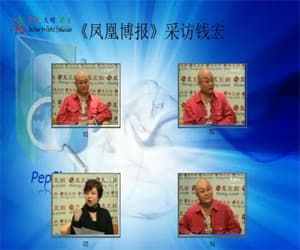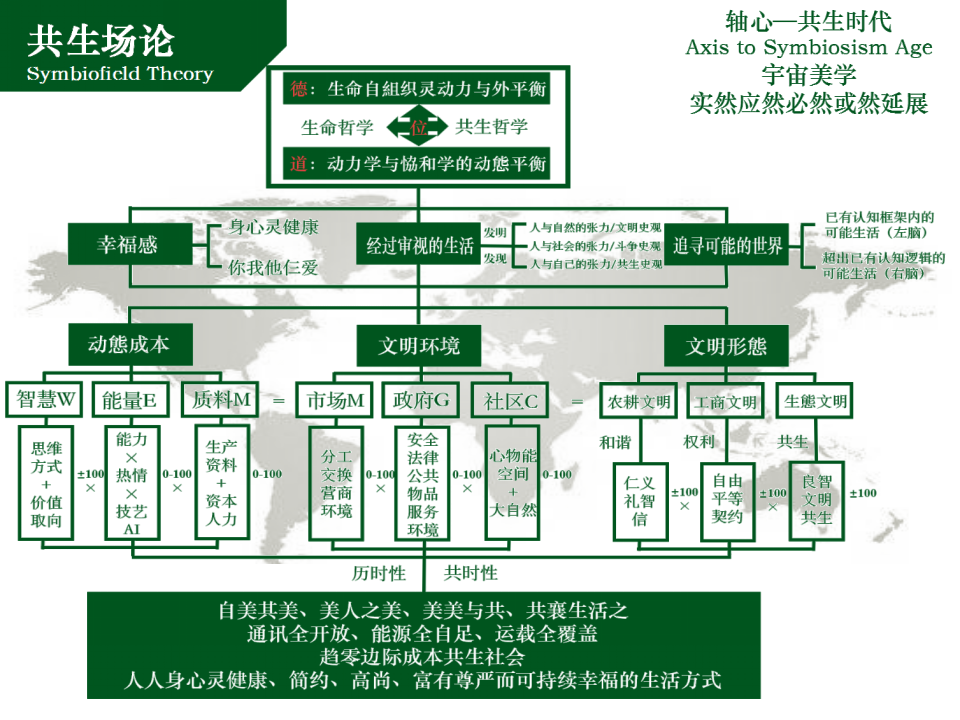New Articles
-
 经济学的认知偏蔽与分化催生新思维 2026/02/24
经济学的认知偏蔽与分化催生新思维 2026/02/24【共生经济学·前言】 经济学的认知偏蔽与分化催生新思维 The Cognitive Bias and Fragmentation of Economics as...
-
 如何面对“终极的免费午餐”? 2026/02/22
如何面对“终极的免费午餐”? 2026/02/22《共生经济学》自序 如何面对“终极的免费午餐”? How Should We Face the “Ultimate Free Lunch”? 一、从宇...
-
 全球共生范式下的现代正常国家 2026/02/17
全球共生范式下的现代正常国家 2026/02/17全球共生范式下的现代正常国家 Modern National Normalization under the Global Symbiotic Paradigm ...
-
 论殖官主义:政权更迭为何不能终结人民的苦难? 2026/02/16
论殖官主义:政权更迭为何不能终结人民的苦难? 2026/02/16论殖官主义:政权更迭为何不能终结人民的苦难? Chinese Reproductive Officialdom: Why Regime Change Has Not...
共生思想理论前沿
THE THEORY
-

-

-

-
 关于中文“共生”翻译及对应的人、事、物之说明
关于中文“共生”翻译及对应的人、事、物之说明关于中文“共生”翻译及对应的人、事、物之说明 ——Symbiosism:Charles Thomas Taylor &Qian hong又一次量子缠绕...
查看详细说明
Speech
-
 三大自组织货币的共生格局——宏观世界之数字货币 2021/07/08
三大自组织货币的共生格局——宏观世界之数字货币 2021/07/08三大自组织货币的共生格局 ——宏观世界之数字货币 钱 宏 The Institute for Global Symbiosism(...
-
 新汉字yǜ的释义 2019/11/16
新汉字yǜ的释义 2019/11/16语从金音玉(Yǜ):金口玉言,一诺千金,性人诚恳、执信; &n...
-
 钱宏:中国的真实经验与未来走向(凤凰博报专... 2019/11/16
钱宏:中国的真实经验与未来走向(凤凰博报专... 2019/11/16点击播放 中国的真实经验与未来走向《凤凰博报》专访钱宏主持人:...
交互主体共生,重塑“国际关系学”(Intersubjective Symbiosism, Reshapes “International Relations”)
发布时间:2024/12/03 公司新闻 浏览次数:301
交互主体共生,重塑“国际关系学”
Intersubjective Symbiosism, Reshapes “International Relations”
钱 宏 Archer Hong Qian
交互主体共生(Intersubjective Symbiosism)哲学,重新定义国际关系原则和实践的变革潜力。
在不断发展的全球政治格局中,传统国际关系理论(International Relations ,IR)的局限性日益明显。现实主义、自由主义和建构主义虽然提供了宝贵的见解,但往往无法预测和解决当代国际互动中微妙的相互关联和现实冲突问题。尤其突出的是:现行IR主要关注支配全球互动的权力动态、国家主权和经济利益的相互依存和制约,几乎完全忽略了作为全球行为个体权能及其生命自组织力与外连接力的积极发挥,对于“国家行为体”权能运行、制衡的目的性和动力源意义。
IS哲学注意到现行IR的缺失,提出国际关系的本质和目的,深深植根于全球行为主体间的生态情怀、存同尊异、间道竞合、赎福共生。交互共生思想,提供了一个审视国际关系复杂性的新视角 :在塑造全球事务中,在认知上超越当事方以主体(Subject)自居而以他者为客体(Object)的交互主体共生,构成了国际关系的基石,为IR语境带来全新的范式转变。
新IR进一步讨论:
1、国家行为体的定位:从战国时代开始分析国家行为体的角色,从主权在官,到主权在民,进而官民交互主体共生。
2、现行国际关系学的缺失:当前国际关系理论中绝对主权观念的不足,让国际安全构架和全球治理成为空谈。
3、国际关系理论的再认识:重新思考国际关系的基础理论。
4、新国家形态:“小即是美”的国家形态将成为大势所趋,国家、国际组织和跨国企业(如星链公司)全球行为体的交互作用。
5、终止俄乌战争的第三条通路:化解冲突,重建世界新秩序。
6、范式重塑:建构人类孞联网(MindsWeb),国际关系学的重大转变。
7、社会再平衡理论:国际关系学的社会再平衡之5大要义。
总之,新IR理论强调,国家利益依赖于个人权能和社会生态的平衡。这种理念将有助于现行国家内部和国际关系的健康发展。
2024年7月1日-18日于温哥华-阿拉斯加-温哥华
Intersubjective Symbiosism, Reshapes “International Relations”
By Archer Hong Qian
The philosophy of Intersubjective Symbiosism (IS) offers transformative potential for redefining principles and practices in international relations (IR).
In the evolving global political landscape, the limitations of traditional IR theories are becoming increasingly evident. Realism, liberalism, and constructivism, while valuable in their insights, often fall short in predicting and addressing the nuanced interconnections and real-world conflicts that characterize contemporary international interactions. These theories primarily focus on the dynamics of power, state sovereignty, and economic interdependence, largely neglecting the active role of individual empowerment, self-organizational capacities, and external connectivity in shaping global relations. Moreover, the current frameworks overlook the purposive and motivational underpinnings of state actor behavior and the equilibrium among these forces.
IS philosophy recognizes these gaps in existing IR theories and asserts that the essence and purpose of international relations are deeply rooted in ecological empathy, respect for diversity, cooperative competition, and redemptive symbiosis among global actors. By emphasizing intersubjective symbiosis, this philosophy provides a novel lens to examine the complexities of international relations. It transcends the traditional subject-object dichotomy, promoting intersubjective cooperation as the foundation of global affairs, thereby introducing a paradigm shift in the context of IR.
Key Discussions in New IR:
- Repositioning State Actors: Analyzing the evolving role of state actors from the Warring States period to modern times, transitioning from “sovereignty vested in officials” to “sovereignty vested in the people,” and ultimately to an intersubjective symbiosis between officials and citizens.
- Addressing Gaps in Existing IR Theories: Highlighting the inadequacies of the absolute sovereignty concept in current IR theories, which render international security frameworks and global governance aspirations ineffective.
- Rethinking Foundational Theories: Reevaluating the fundamental premises of international relations to align with contemporary global challenges.
- Emergence of New State Forms: Advocating for “small is beautiful” as a rising trend in state models, emphasizing the interplay among states, international organizations, and global actors like multinational corporations (e.g., SpaceX’s Starlink).
- A Third Path to End the Russia-Ukraine War: Proposing innovative methods to resolve conflicts, offering a pathway to end the Russia-Ukraine war, and establishing a new world order.
- Paradigm Reshaping: Constructing the human MindsWeb (孞联网), a transformative shift for international relations.
- Theory of Social Rebalancing: Introducing the five key principles of social rebalancing within the framework of IR to promote stability and equity.
Conclusion:
The new IR framework emphasizes that state interests are inherently dependent on the balance between individual empowerment and social ecology. This perspective offers a pathway to healthier development within nations and in their international relations. By incorporating the principles of intersubjective symbiosis, this transformative vision provides a solid foundation for addressing the challenges of a rapidly changing global order.
July 1-18, 2024 in Vancouver-Alaska-Vancouver
参看:













您好!请登录
已有0评论
购物盒子